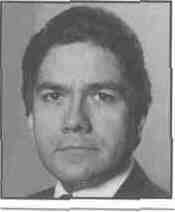Chicago
Juan Andrade, voter project
boost empowerment of Hispanics
By MANUEL GALVAN
Nearly a dozen years ago, Mayor Harold Washington addressed a then fledgling Hispanic Leadership Conference and acknowledged the support of Latinos in electing him. "I would not be in this office were it not for the Hispanic community which gave me their votes and confidence," Washington told the more than 500 persons attending the 1983 conference. Were it not for the Midwest/Northeast Voter Registration Education Project, Washington might never have conceded that Hispanics tipped the scales in his favor. An exit poll taken by the Midwest group, which monitors Hispanic voting trends, showed that an estimated 75 percent of Latinos cast their ballots for Washington in the April 1983 election. Because the majority of whites and African-Americans split their votes, Hispanics swung the election for Chicago's first black mayor. Yet the "black and brown coalition" was shaky almost from the start, with the mayor being pressured by African-Americans to concentrate on having his administration grant them "our turn" demands and appointments. In the end, the media circulated Midwest's poll results widely, and Washington spoke at the Leadership Conference. Washington "did some very positive things in bringing Hispanics into politics," recalls Juan Andrade Jr., president of the Midwest/Northeast Project. "For the first time, Hispanics from the northwest and southwest sides of Chicago began to coalesce." The downside came when Washington failed to keep his promise of appointing a Hispanic deputy mayor. Although top Hispanics had made a pact not to campaign for the slot, former alderman and state representative Juan Soliz cracked the Latino bloc by pushing himself for the post. "This created the environment in City Hall that you could pass over Hispanics because they didn't have their act together," Andrade says. "The mayor surrounded himself with people who began the process of shutting out Hispanics." Midwest Voter was one year old then; today it's 12. Since 1982 it has conducted field activities in 18 states, including 535 nonpartisan voter registration campaigns, resulting in the registration of more than 1 million new voters, publication of more than 170 studies on political behavior and demographics and sponsorship of 11 Hispanic Leadership Conferences. In Chicago alone its support has driven the empowerment of Hispanics, from no aldermen, state representatives, state senators or congressmen in 1982 to four aldermen, four state representatives, two state senators and one congressman, in just over a decade. In a recent interview, Andrade critiqued the other Chicago mayors in office during the life of the voter organization: Mayor Jane Byrne "On the positive side, she fulfilled her commitment to bring Hispanics into government. On the down side, she had to be sued for redistricting to give Hispanics four city council seats." Cook County Clerk David Orr, who served as mayor eight days and whose people insisted on having his photograph added to the wall of mayors on the fifth floor of City Hall "Taxes didn't go up and there were no scandals. David Orr would have made an excellent mayor." Mayor Eugene Sawyer "Sawyer had no clue about what Hispanics were about." Mayor Richard M. Daley "Daley probably came in knowing the least about Hispanics and has done more for Hispanics than all of the previous mayors combined. Daley was aware of his solid election support among Hispanics and remembered, 'You dance with the ones who brung you,'" says Andrade in the drawl he acquired growing up in Brown- wood, Texas. Andrade, 47, has received several awards and recognitions in his 12 years of running the Midwest organization, including being named Man of the Year by the American G.I. Forum of Illinois in 42/July 1994/Illinois Issues 1993 and one of the Chicago Sun-Times' "People to Watch in '94." Andrade has shared his voting expertise throughout the Americas, giving seminars, interviews and lectures in Bolivia, Colombia, Guatemala, Guyana, Haiti, Mexico, Nicaragua, Panama, Paraguay and Suriname. Yet, one of the longest battles for voting rights is still being waged registration. Hispanics and minorities generally have the smallest percentage of registered voters for a variety of reasons, including interest and confidence in the system. But in Illinois, the state's election laws for keeping the voter rolls up to date effectively serve to keep minority figures low. Andrade says no state "purges" more than Illinois, removing from the rolls registered voters who authorities believe have moved. Voters are scrutinized before every election, and some 150,000 registrations are questioned each time. In the past, all of them would have been removed from the rolls until they reregistered or showed the purge was in error, usually after the election. Since 1987, however, when a lawsuit altered the process, challenged voters are put on a suspended list and can vote on election day, if they can prove they still live at the same address. The days of precinct captains removing non-friendly voters from the rolls have past. But minorities often lose the ability to vote because they still move more frequently than others and don't file a change of address with the Chicago Board of Election Commissioners. Much of the work that lies ahead for the Midwest group is educating Hispanics about election reforms and procedures. Andrade expects more than 2,000 participants from at least 30 states for the October 27-30 conference, making it the largest gathering of its kind in the nation. Perhaps the longest lasting impact will come from the training sessions where Hispanic leaders prepare for the future. Latino elected officials are likely to double in the next six years, including a second Illinois congressman. Once only a dream, political empowerment is becoming a reality as Hispanics see major gains after the 2000 census. Manuel Galvan is a Chicago-based writer and marketing consultant. July 1994/Illinois Issues/43
|
|||||||||||||||

